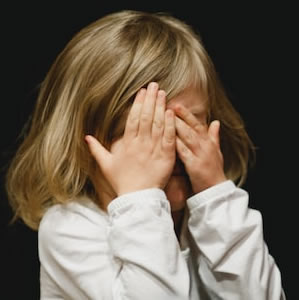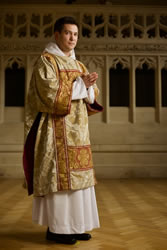

Day 48, Chronological Bible Study Timeline. Map. Go to today’s Bible reading (use your browser arrow to return): Leviticus 5–7
Guilt and Responsibility
“Who broke the lamp?”
“Not me!”
“Who put the scratch on my car?”
“Not me!”
“Who wrote on the wall?”
“Not Me!”
Right and Wrong Ways to Deal with Guilt
Children learn how to lie as they grow up, so they're experts when they become teenagers and adults. If they're wrong, they often don't admit it. Instead, they shift the blame to other people or circumstances.
But is that what God wants? No. Suppose they (or we) are guilty of anything. In that case, he wants his followers to be ashamed, admit their wrongs, and take responsibility for their actions.
In the months following Israel's meeting with God at Mt. Sinai, he has particular instructions for his people so they can deal with their guilt. Although the instructions given to them are not the same as what the Lord provides for us, this lesson will also show us how to get rid of guilt.
Priestly Duties
Today's Bible reading shows the priests' duties to administer the burnt, sin, grain, fellowship, and guilt offerings. The instructions help the priests know what to do with the offerings the people bring.
After the priests offer the fat and kidney portions of approved animals or offer a portion of the grain offerings, the priests share the best of what remains. From this, we can learn if we are responsible and faithful to our tasks, we often share God's best.
Dealing with guilt in Israel's day
Closely akin to the sin offering is the guilt offering. The guilty party brings a perfect (unblemished) ram for a sacrifice. A person with fewer resources may bring a spotless lamb, two doves, or pigeons. The poorest of Israelites may bring two liters of fine flour to toss on top of a sacrifice being burned on the altar.
After they slay the animal or bird, the worshipper brings the blood of his sacrifice to the altar and sprinkles it on all sides of it. The rest he pours out at its base. He only offers the blood and fat on the bronze altar—he gives the good parts of the animal or bird to the priests to eat (unless the offering is on behalf of his own sins). The remains he takes outside of the camp for burning.
How do we get rid of our guilt today?
Most of us are not Israelites, and none of us offer burnt sacrifices (unless it's our own meal). What should we do when we are guilty of a sin against God, family members, neighbors, co-workers, or even strangers?
There are three elements to the guilt offering, two of which are not present in the sin offering.
First, the confession of the sins committed toward God or man, whether or not they were intentional. These sins include guilt for
• witnessing or having knowledge of a crime but keeping silent
• unintentionally breaking one of God's commands
• unintentionally touching an animal or human carcass
• handling something else, which makes him unclean
• making a rash vow
• not offering his sacrifice as prescribed by God
• defrauding someone
• robbing someone
• swearing falsely
• Paying the penalty, the sin offering.
• Complete restitution with twenty percent added to it when appropriate.
Like the Israelites, we need to take responsibility for it. We need to confess our wrongs to the one (s) we have offended, whether or not our sin was intentional. As soon as we are aware of it, we need to confess our misdeeds, if possible. This is difficult, especially if we are excuse our behavior and shift our blame onto others. It's time to courageously face our responsibilities, humble ourselves, and admit wrong. Only by doing this will we find peace.
Second, we need to seek the Lord's forgiveness. Unlike the animals the Israelites offered, Jesus Christ is the perfect sacrifice to pay the penalty for our sin—he is our sin and guilt offering Hebrews 9:13-14). The Apostle John writes, “if we confess our sins, he is faithful and just and will forgive us our sins and purify us from all unrighteousness” (1John 1:9, NIV).
Third, like the Israelites, we need to make complete restitution for the wrong (s) we have done, if at all possible. Do we need to add twenty percent? There is no commandment in the New Testament regarding this directive. However, in some cases, if we follow that principle, it will discourage lawsuits—we are presenting ourselves as honest and willing to make things right. The penalty we pay might also deter further misbehaviors.
Additional Responsibilities of the Priests and the Offerings
For the burnt offering, the priest makes sure the bronze altar is always burning. Why? Perhaps this symbolizes God's readiness to receive offerings. Whenever we come to the LORD, he's always ready to forgive us or accept our praise and dedication offerings.
After they burned the sacrifice, they take its remains outside of the camp. Whenever this is done, the priest wears clean linen garments before he handles the ashes—the tabernacle and altar are holy, and the sacrifice is set apart to God. Afterward, he changes into regular clothes to take them to a ceremonially clean place outside the camp.
When the priests bring grain offerings before the LORD, they offer a handful as a memorial portion, and then the priest and his family share the rest. The only exception to sharing the grain offering is if it was for the anointing of a priest. It is then that the grain offering is a dedication to God alone, and they burn up all the rest of the sacrificial animals. As with the other offerings, the sin offering was sacred, and anything touching it became holy.
Today, Jesus is our sin offering.
…we have been made holy through the sacrifice of the body of Jesus Christ once for all… because by one sacrifice he has made perfect forever those who are being made holy (Hebrews 10:10,14, NIV).
Interestingly, in New Testament times when he heals people, some express the faith they will be healed if they can only touch him. Those who do are made whole (Matthew 9:20-21; Matthew 14:35-36; Mark 3:10; Mark 6:56; Mark 8:22; Luke 5:12-13; Luke 6:19). When Jesus touches us spiritually, he heals our sinful souls and makes us holy.
The fellowship offering is a communal offering of thanksgiving, given upon fulfillment of a vow, or simply an offering freely given (a free-will) offering. A person presents a sacrifice to the priests, along with a grain offering. After the blood and fat are burned on the altar, the priests, the worshipper, and his family eat the cooked meal. The priests eat the breast, thighs, and unleavened bread cakes. The worshipper and his family may eat the rest of the good part of the animal and bread made with yeast, but they cannot eat any bloody meat or fat. They, too, must be ceremonially clean to take part in the fellowship offering. God's concern, as always, is that the people be holy because he is holy. He requires the same of us (1Peter 1:15-16; Leviticus 11:44,45; 19:2; 20:7).
Discussion
When we are guilty, how does God want us to act?
How is the penalty of our guilt paid for?
Is confession of our sins enough to rid us of guilt?
Focus Verse
1John 1:9 (NIV) “If we confess our sins, he is faithful and just and will forgive us our sins and purify us from all unrighteousness.”
If you want to see a video presentation of this lesson, go here
Photo by Caleb Woods on Unsplash
Photo by Father James on Unsplash
Write a private prayer response to today’s Bible study:
Please send your comments to me, Rod, the author
Looking Ahead: Like the priests, God has chosen us to minister to others. However, we need to serve with honor, not dishonor. Find out what that means in our next lesson.
Back to top of page
Return to Chronological Bible Studies main page
Go to Scriptures main page
Go to Topics main page
Go to Home pagere-edited 2-17-23
COPYRIGHT @ 2019, MASTER'S TOUCH BIBLE STUDIES

